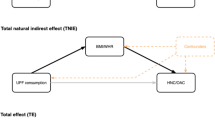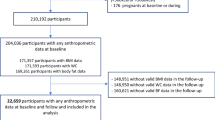Abstract
Colorectal cancer (CRC) is a frequently occurring cancer in Jordan. CRC risk is expected to continue rising due to dietary patterns, sedentary lifestyle, and other practices. The aim of this study was to describe the prevalence of dietary and lifestyle risk factors for CRC among patients attending outpatient gastroenterology clinics in Jordan. A descriptive, cross-sectional design was used to collect data from 713 asymptomatic participants. Data was collected using a self-report questionnaire measuring sociodemographic characteristics, dietary habits, physical activity, and lifestyle risk factors of CRC. The mean age of participants was 57.0 ± 8.56 years. The majority of participants were male (71.8 %) and with less than secondary school formal education (60.7 %). The commonest risk factors for CRC among the participants were overweight or obesity (76.1 %), lack of exercise (71.6 %), limited consumption of vegetables (70.8 %), smoking (60.6 %), over consumption of red meat (56.3 %), and diabetes mellitus (24.1 %). Dietary and lifestyle risk factors for CRC are prevalent in Jordan and likely to fuel an upsurge CRC if population-wide educational interventions are not implemented. There is need for greater attention and emphasis on strategies to educate the general population about healthy dietary and lifestyle habits as means of preventing CRC in Jordan.
Similar content being viewed by others
References
Ferlay J, Shin HR, Bray F et al (2010) GLOBOCAN 2008, Cancer incidence and mortality worldwide: IARC Cancer Base No. 10 [Internet]. IARC, Lyon, Available from: http://globocan.iarc.fr
National Cancer Registry (NCR) (2010) Cancer incidence in Jordan report of 2009. Non-Communicable Diseases Control Section, Amman
World Health Organization (2015) Cancer country profiles. Access from http://www.who.int/cancer/country-profiles/jor_en.pdf?ua=1 on 2 February, 2015
Tayyem R, Shehadah I, Abu-Mweis S, Bawadi H, Bani-Hani K, Al-Jaberi T, Al-Nusairr M, Heath D (2014) Fruit and vegetable intake among Jordanians: results from a case–control study of colorectal cancer. Cancer Control J Moffitt Cancer Center 21(4):350–360
Arafa M, Waly M, Jriesat S, AlKhafajei A, Sallam S (2011) Dietary and lifestyle characteristics of colorectal cancer in Jordan: a case control study. Asian Pac J Cancer Prev 12(8):1931–1936
Giovannucci E, Wu K (2006) Cancers of the colon and rectum. In: Schottenfeld D, Fraumeni JF Jr (eds) Cancer epidemiology and prevention. Oxford University Press, New York, pp 809–829
Boyle P, Leon ME (2002) Epidemiology of colorectal cancer. Br Med Bull 64:1–25
Umar A, Greenward P (2009) Alarming colorectal cancer incidence trends: a case for early detection. Cancer Epidemiol Biomarkers Prev 18:1672–1673
Huxley RR, Ansary-Moghaddam AA, Clifton P, Czernichow S, Parr CL, Woodward M (2009) The impact of dietary and life style risks of colorectal cancer: a quantitative overview of the epidemiology evidence. Int J Cancer 125(1):171–180
World Cancer Research Fund (2008) Food, nutrition and the prevention of cancer; a global perspective. American Institute for Cancer Research, Washington, DC
World Cancer Research Fund/American Institute for Cancer Research. Continuous Update Project Report (2011) Food, nutrition, physical activity, and the prevention of colorectal cancer
Wiseman M, The second World Cancer Research Fund/American Institute for Cancer Research expert report (2008) Food, nutrition, physical activity, and the prevention of cancer: a global perspective. Proc Nutr Soc 67:253–256
Al-Jabbri TM, Ammari F, Gharieybeh K, Khammash M, Yaghan RJ, Heis H, Al-Omari N (1997) Colorectal adenocarcinomas in a defined Jordanian population from 1990 to 1995. Dis Colon Rectum 40:1089–1094
Ibrahim EM, Zeeneldin AA, El-Khodary TR, Al-Gahmi AM, Bin Sadiq BM (2008) Past, present, and future of colorectal cancer in the Kingdom of Saudi Arabia. J Gastroenterol 14:178–182
Malekzadeh R, Bishehsari F, Mahdavinia M, Ansari R (2009) Epidemiology and molecular genetics of colorectal cancer in Iran: a review. Arch Iran Med 12:161–169
Bassaleem HO, Al-Sakkaf KA (2004) Colorectal cancer among Yemeni patients: characteristics and trends. Saudi Med J 25:1002–1005
Isbister WH (1992) Colorectal cancer below age 40 in the Kingdom of Saudi Arabia. Aust N Z J Surg 62:468–472
Veruttipong D, Soliman AS, Gilbert SF, Blachley TS, Hablas A, Ramadan M et al (2012) Age distribution, polyps and rectal cancer in the Egyptian population based cancer registry. World J Gastroenterol 18:3997–4003
Ansari R, Mahdavinia M, Sadjadi A, Nouraie M, Kamangar F, Bishehsari F, Fakheri H, Semnani S, Arshi S, Zahedi MJ et al (2006) Incidence, and age distribution of colorectal cancer in Iran: results of a population based cancer registry. Cancer Lett 240:143–147
World Health Organization (2002) Obesity: preventing and managing the Global Epidemic. Access from http://www.who.int/nutrition/publications/obesity/WHO_TRS_894/en/ on 2 February, 2015
Musaiger AO (2004) Overweight and obesity in the Eastern Mediterranean Region: can we control it? East Mediterr Health J 10:789–793
Madanat HN, Troutman KP, Al-Madli BT (2008) The nutrition transition in Jordan: the political, economic and food consumption contexts. Promot Educ 15:6–10
Department of Statistics (DOS) (2002) Household income and expenditure survey. Amman
Willett WC, Stampfer MJ, Colditz GA, Rosner BA, Speizer FE (1990) Relation of meat, fat, and fiber intake to the risk of colon cancer in a prospective study among women. N Engl J Med 323:1664–1672
La Vecchia C, Negri E, Decarli A, D'Avanzo B, Gallotti L, Gentile A, Fkanceschi S (1988) A case‐control study of diet and colorectal cancer in northern Italy. Int J Cancer 41(4):492–498
Borugian MJ, Sheps SB, Whittemore AS et al (2002) Carbohydrates and colorectal cancer risk among Chinese in North America. Cancer Epidemiol Biomarkers Prev 11:187–193
Colditz GA, Cannuscio CC, Frazier AL (1997) Physical activity and reduced risk of colon cancer: implications for prevention. Cancer Causes Control 8:649–667
Byers T, Nestle M, McTiernan A et al (2002) American Cancer Society and Nutrition and Physical Activity Guidelines Advisory Committee. American Cancer Society guidelines on nutrition and physical activity for cancer prevention: reducing the risk of cancer with healthy food choices and physical activity. CA Cancer J Clin 52:92–119
Giovannucci E, Colditz GA, Stampfer MJ et al (1996) Physical activity, obesity and risk of colorectal adenoma in women (United States). Cancer Causes Control 7:253–263
Payne JE Colorectal carcinogenesis. Aust N Z J Surg 60:11–18
Renehan AG, Tyson M, Egger M et al (2008) Body-mass index and incidence of cancer: a systematic review and meta-analysis of prospective observational studies. Lancet 371:569–578
Khaw KT, Wareham N, Bingham S et al (2004) Preliminary communication: glycated hemoglobin, diabetes, and incident colorectal cancer in men and women: a prospective analysis from the European prospective investigation into cancer-Norfolk study. Cancer Epidemiol Biomarkers Prev 13:915–919
Calle EE, Rodriguez C, Walker-Thrumind K et al (2003) Overweight, obesity, and mortality from cancer in a prospectively studied cohort of US adults. N Engl J Med 348:1625–1638
Adami HO, Trichopoulos D (2003) Obesity and mortality from cancer. N Engl J Med 348:1623–1624
Fuchs CS, Giovannucci EL, Coldits GA, Hunter DJ, Speized FE, Willet WC (1994) A prospective study of family history and the risk of CRC cancer. N Engl J Med 331:1669–1674
Giovannucci E, Rimm EB, Stampfer MJ, Colditz GA, Ascherio A, Willett WC (1994) Intake of fat, meat, and fiber in relation to risk of colon cancer in men. Cancer Res 54:2390–2397
Giovannucci E, Martinez ME (1996) Tobacco, colorectal cancer, and adenomas: a review of the evidence. J Natl Cancer Inst 88:1717–1730
Chao A, Thun MJ, Jacobs EJ et al (2000) Cigarette smoking and colorectal cancer mortality in the Cancer Prevention Study II. J Natl Cancer Inst 92:1888–1896
Acknowledgments
The authors express their appreciation to all participants in this study.
Author information
Authors and Affiliations
Corresponding author
Ethics declarations
The study was approved by the Institutional Review Board of Jordan University of Science and Technology and the Ministry of Health Ethical Committee.
All patients were informed about the study aim, and they were requested to give written informed consent before participating in the study.
Conflict of Interest
The authors declare that they have no competing interests.
Rights and permissions
About this article
Cite this article
Omran, S., Barakat, H., Muliira, J.K. et al. Dietary and Lifestyle Risk Factors for Colorectal Cancer in Apparently Healthy Adults in Jordanian Hospitals. J Canc Educ 32, 447–453 (2017). https://doi.org/10.1007/s13187-015-0970-5
Published:
Issue Date:
DOI: https://doi.org/10.1007/s13187-015-0970-5




